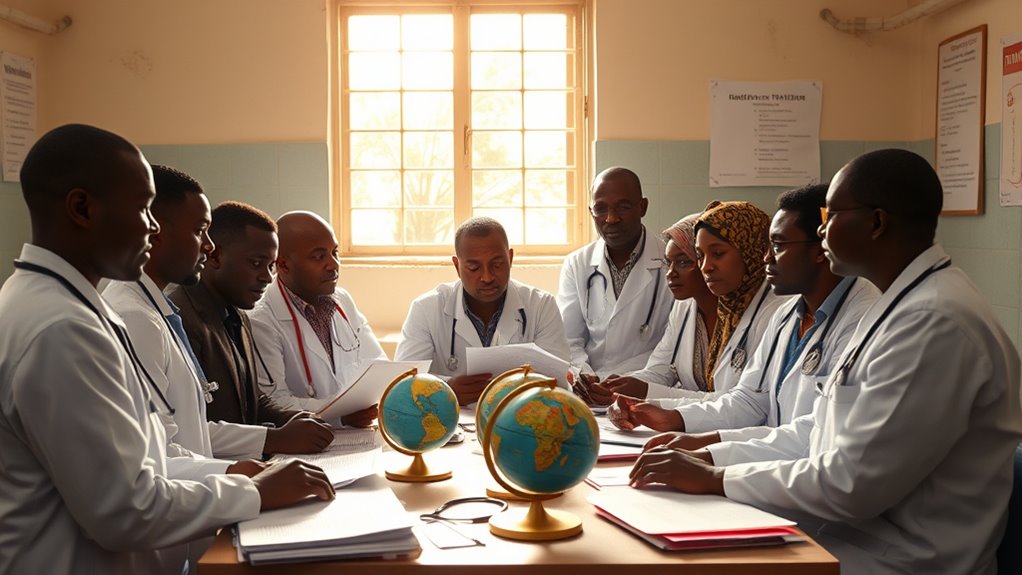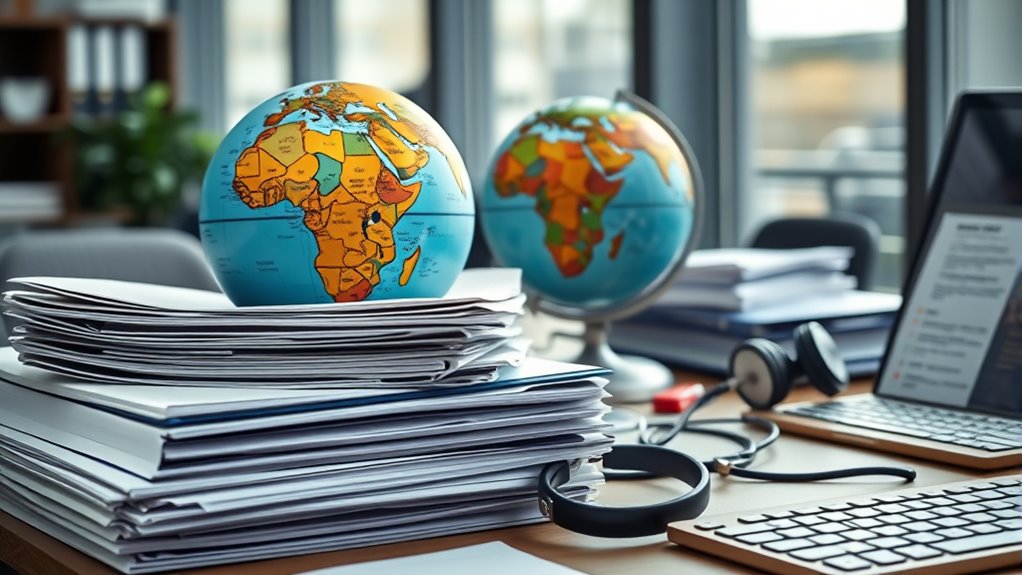Certified translations for medical records in Africa guarantee accurate communication in multilingual settings, promoting patient safety and equitable healthcare access. Professionals handle diverse languages like Swahili, Arabic, Amharic, and Hausa, adhering to international standards such as ISO 17100 for quality and legal compliance. These services prevent misdiagnoses, enhance trust, and support public health initiatives. Insights into costs, processes, and legal aspects continue ahead.
Quick Summaries
- Certified translations ensure accurate medical communication and patient safety across Africa’s diverse languages.
- Translation Africa provides certified services for medical records, using expert linguists and adherence to ISO standards.
- Services cover key African languages like Swahili, Arabic, Amharic, and Hausa for seamless healthcare exchanges.
- Quality assurance includes rigorous reviews, error detection, and cultural adaptation to maintain accuracy.
- Legal compliance, costs based on language complexity, and timely delivery make choosing services straightforward.
Importance of Certified Medical Translations in Africa

In a continent as linguistically diverse as Africa, certified medical translations are essential for ensuring accurate communication in healthcare. This accuracy is critical for patient safety, as misinterpretations can lead to misdiagnoses or ineffective treatments, potentially endangering lives. In regions with multiple official languages, such translations bridge gaps between healthcare providers and patients, fostering trust and compliance with medical advice. They also play a crucial role in public health initiatives, where precise information dissemination prevents the spread of diseases and supports informed decision-making. Legally, certified translations uphold standards in cross-border medical collaborations, ensuring documents like prescriptions and reports maintain integrity. Ultimately, they promote equitable access to quality care, reducing disparities in multilingual societies and enhancing overall health outcomes across the continent.
Overview of Translation Services for Medical Records

Various organizations in Africa provide specialized translation services for medical records, employing certified linguists and subject-matter experts to guarantee precise and secure handling of documents. These services cater to diverse languages, including Swahili, French, Arabic, and indigenous dialects, ensuring accurate conversion for cross-border healthcare needs. The process involves meticulous steps: initial translation by qualified professionals, followed by rigorous editing and proofreading to uphold fidelity. Adherence to international standards, such as ISO 17100, is standard practice among providers. Confidentiality protocols, including encrypted data transfer and non-disclosure agreements, protect sensitive information. Many organizations leverage computer-assisted translation tools to enhance consistency and speed, while maintaining human oversight. Training programs for linguists focus on evolving medical terminology, enabling effective service delivery across clinics, hospitals, and research institutions in Africa. This overview highlights the structured approach to reliable medical record translation in the region.
Benefits of Professional Translation for Healthcare

Professional translation services enhance healthcare delivery by ensuring accurate communication of medical information, which reduces errors and improves patient safety. In diverse healthcare settings, these services promote cultural sensitivity, allowing providers to address patient needs more effectively and build trust. Accurate translations enable better comprehension of treatment plans, leading to improved medication adherence and health outcomes. They also facilitate seamless sharing of medical records across borders, supporting continuity of care and international collaborations. Moreover, professional translators uphold strict confidentiality standards, safeguarding sensitive data while minimizing legal risks. This precision enhances operational efficiency in hospitals and clinics, ultimately reducing costs associated with miscommunication and fostering equitable access to quality healthcare for all patients.
Common Languages in African Medical Translations
Africa’s diverse linguistic landscape includes major languages like Swahili, Arabic, and French, which frequently feature in medical record translations. These languages are essential for bridging communication gaps in healthcare settings across the continent. Understanding their role helps address the critical needs for accurate and certified translations in medical contexts.
Major African Languages
Several major languages in Africa, such as Swahili, Arabic, Amharic, and Hausa, are essential for medical translations, facilitating accurate communication across diverse regions and healthcare contexts. Swahili, spoken by millions in East Africa, serves as a lingua franca in countries like Kenya and Tanzania, enabling seamless exchange of medical information in urban and rural settings. Arabic, predominant in North Africa and the Horn of Africa, supports translations for widespread populations in Egypt, Morocco, and Sudan, where it integrates with cultural healthcare practices. Amharic, Ethiopia’s official language, is crucial for addressing the needs of its large speakers in clinics and hospitals. Hausa, prevalent in West Africa including Nigeria and Niger, fosters effective medical dialogue in densely populated areas. These languages bridge linguistic gaps, ensuring that medical terminology is precisely conveyed to enhance understanding and accessibility in African healthcare systems.
Essential Translation Needs
Beyond the major African languages used in medical contexts, such as Swahili and Arabic, translation efforts must address specific needs like precise terminology for patient consultations and documentation to guarantee effective healthcare across the continent. In regions where French predominates, like in West and Central Africa, accurate rendering of medical jargon guarantees clear communication in hospitals and clinics. Similarly, Portuguese in countries such as Angola and Mozambique demands specialized translators who handle nuances in pharmaceutical and diagnostic terms. Other languages, including Amharic in Ethiopia and Hausa in Nigeria, require culturally sensitive adaptations to prevent errors in treatment plans. Certified professionals focus on these essentials, employing tools like glossaries and quality checks to maintain accuracy. This approach minimizes risks, supports global health initiatives, and enhances patient outcomes by bridging language barriers effectively. Ultimately, prioritizing these translation needs fosters equitable medical access throughout Africa.
Legal Requirements for Certified Documents
Certified documents for medical records in Africa must comply with varying legal standards, often requiring official authentication by accredited translators to guarantee validity and admissibility in legal contexts. Across countries like South Africa and Nigeria, regulations may demand notarization, apostilles, or government seals to prevent document rejection. Non-compliance risks severe outcomes, such as delayed treatments or legal disputes, underscoring the human cost of oversight. Adhering to these rules secures accuracy and trust in healthcare systems.
| Potential Risk | Emotional Impact |
|---|---|
| Document rejection | Heightened patient anxiety |
| Delayed medical access | Family distress and helplessness |
| Legal invalidity | Fear of injustice |
| Compromised patient rights | Sense of vulnerability |
| International barriers | Isolation and frustration |
This framework highlights the emotional stakes, emphasizing the need for rigorous compliance to safeguard lives and dignity.
Step-by-Step Guide to Translation Process
The translation process for certified medical records in Africa starts with receiving the documents from the client. This step is followed by translating the content to guarantee accuracy and cultural appropriateness. Quality assurance then verifies the final output against industry standards.
Receive Documents
Receiving documents initiates the translation process for medical records in Africa. This step involves secure submission and initial handling to guarantee confidentiality and accuracy. Clients provide records through encrypted channels, where providers verify details without proceeding to translation. It sets a foundation for efficient service by prioritizing data protection and compliance with health regulations.
- Submit documents via encrypted online portals for seamless security.
- Verify authenticity with quick identity checks to build trust.
- Check for complete sets of records to avoid delays.
- Handle submissions with strict privacy protocols for peace of mind.
- Receive prompt confirmations that keep you informed and engaged.
Translate Content
Translators meticulously convert medical records into the target language, adhering to strict accuracy standards and cultural nuances essential for African contexts. This step-by-step guide outlines the process for effective translation.
First, translators thoroughly review the source document, identifying key medical terminology and contextual details. They compile a specialized glossary, drawing from resources tailored to African healthcare systems, to guarantee term accuracy.
Next, the translation begins with drafting core content, translating section by section while preserving the original meaning. Translators focus on precise language, adapting phrasing to avoid ambiguity in medical descriptions.
Subsequently, cultural sensitivities are addressed, such as localizing references to illnesses or treatments that vary across African regions. This step involves integrating context-specific adaptations without altering factual integrity.
Finally, the translated text is organized to mirror the source structure, promoting clarity and usability in professional settings. This methodical approach supports reliable communication in diverse African environments.
Quality Assurance
After the translation draft is complete, quality assurance involves a rigorous review to detect and correct errors, ensuring the document’s accuracy, consistency, and adherence to medical standards in African contexts. This stage employs certified professionals to scrutinize terminology, cultural nuances, and regulatory compliance, minimizing risks in healthcare delivery. It integrates technology like translation software for error detection, alongside human expertise for context-specific validation.
- Peer review by bilingual experts to catch subtle inaccuracies and enhance reliability.
- Cultural sensitivity checks to adapt content for diverse African languages and customs.
- Terminology verification against medical databases for precision in diagnoses and treatments.
- Consistency audits to maintain uniform language across records, reducing confusion.
- Final compliance assessment ensuring alignment with African health regulations and global standards.
Ensuring Accuracy in Medical Record Translation
Guaranteeing accuracy in medical record translation demands rigorous protocols, particularly in regions like Africa where linguistic diversity can complicate healthcare delivery. Translators must undergo specialized training in medical terminology and cultural contexts to minimize errors. Employing certified professionals guarantees familiarity with both source and target languages, reducing risks of misinterpretation. Quality checks, such as double-blind reviews and back-translation, verify content integrity. In Africa, where multiple dialects prevail, adapting translations to local nuances is essential. Technology, like computer-assisted tools, aids in maintaining consistency without replacing human expertise. Adherence to standards like ISO 13485 promotes precision, safeguarding patient safety. Ultimately, these measures prevent communication breakdowns that could lead to adverse health outcomes. Accuracy remains paramount in bridging language gaps effectively.
Why Choose Translation Africa for Your Needs
Translation Africa distinguishes itself through its expert team of professionals specialized in certified medical record translations. The company’s rigorous quality assurance processes guarantee accuracy and compliance with industry standards. Moreover, reliable delivery options make it a dependable choice for clients across Africa.
Expert Team
The expert team at Translation Africa consists of certified linguists and medical specialists with extensive experience in Africa, ensuring precise and culturally sensitive translations for medical records. These professionals combine linguistic expertise with in-depth knowledge of African healthcare systems, delivering translations that maintain accuracy and respect local nuances. Their collaborative approach enhances reliability for clients managing complex medical documentation.
- Diverse language mastery: Covering over 50 African languages for broad accessibility.
- Medical field integration: Specialists with backgrounds in nursing and public health for contextually accurate work.
- Regional cultural insight: Deep understanding of African customs to avoid misinterpretations.
- Proven track record: Years of successful projects in high-stakes environments like clinics and research.
- Continuous professional growth: Regular training to stay updated on evolving medical terminology and practices.
Quality Assurance
Quality assurance at Translation Africa prioritizes accuracy and reliability through a multi-layered review process, involving peer checks and final validations by certified experts. This approach guarantees that every medical translation meets stringent industry standards, minimizing errors that could impact patient care or legal compliance. Translators adhere to ISO guidelines, employing specialized glossaries and cultural adaptations to maintain precision in sensitive contexts. Regular training sessions for the team enhance proficiency, fostering a culture of continuous improvement. By integrating advanced technology, such as AI-assisted proofreading, Translation Africa upholds impeccable quality without compromising confidentiality. Clients benefit from this rigorous system, which guarantees translations are not only accurate but also contextually appropriate, making it a trusted choice for medical records in Africa. This commitment ultimately supports better healthcare outcomes through dependable linguistic services.
Reliable Delivery
Reliable delivery forms the cornerstone of Translation Africa’s services, ensuring that medical records reach clients promptly and intact. The company employs advanced logistics and secure protocols to handle translations efficiently, minimizing delays and safeguarding sensitive data. This focus on reliability enhances trust, allowing healthcare professionals to rely on seamless processes for critical documents.
- Guaranteed timelines: Projects delivered on schedule with clear deadlines.
- Real-time tracking: Clients monitor shipments via user-friendly platforms.
- Secure handling: Encrypted channels protect against data breaches.
- Dedicated support: 24/7 assistance for any delivery concerns.
- Proven reliability: A track record of 99% on-time success rates.
Cost Factors in Certified Translation Services
Cost factors in certified translation services for medical records in Africa depend on variables such as language pair complexity, document volume, and urgency requirements. Language pair complexity arises from the rarity of certain African languages, like Wolof or Amharic, which demand specialized translators and increase rates. For instance, translating from a less common language to English often incurs higher fees due to the need for expert linguists. Document volume plays a key role; longer records or multiple files lead to scaled pricing based on word count or pages, making bulk translations more economical per unit. Urgency requirements can escalate costs substantially, with expedited services—such as 24-hour turnaround—commanding premiums to cover overtime and priority handling. Additionally, certification types, like official notarization, add layers of expense due to administrative processes. Providers in Africa may also factor in regional economic conditions, such as currency fluctuations, affecting overall pricing structures. Understanding these elements helps clients budget effectively for accurate, timely services.
Quality Standards for Medical Document Handling
Maintaining rigorous standards in medical document handling is essential for guaranteeing accuracy and reliability in translations, particularly in Africa’s diverse linguistic landscape. These standards mitigate errors that could affect patient care, compliance, and legal validity. In regions with multiple languages, certified processes safeguard sensitive health information while upholding international norms.
- Adherence to ISO Standards: Translators follow ISO 17100 to guarantee quality control and error-free outputs.
- Qualified Professionals: Only certified linguists with medical expertise handle documents to preserve technical accuracy.
- Confidentiality Protocols: Strict HIPAA-like measures protect patient data during translation processes.
- Verification Steps: Multiple review layers, including peer checks, guarantee fidelity to original texts.
- Cultural Sensitivity: Adaptations account for regional nuances, enhancing comprehension and usability.
Real-Life Examples of Successful Translations
In diverse African contexts, several successful translations of medical records have exemplified the practical benefits of certified processes, such as enhanced patient safety and seamless cross-border healthcare coordination. For instance, in South Africa, certified translations facilitated accurate sharing of HIV treatment histories between clinics, enabling timely interventions that reduced transmission rates. In Nigeria, a major hospital translated patient records for international referrals, ensuring precise diagnoses and avoiding medication errors during surgeries. Similarly, in Kenya, certified translations supported refugee health programs by integrating records from neighboring countries, improving access to care and outcomes. These cases highlight how professional translation maintains record integrity, fosters trust among providers, and upholds ethical standards, ultimately strengthening healthcare delivery across the continent.
Future Developments in Translation for Healthcare
As successful translations of medical records continue to demonstrate their value across Africa, emerging technologies and standards are set to transform healthcare practices. Artificial intelligence and machine learning are advancing translation accuracy and speed, while global standards aim to guarantee seamless interoperability and security in multilingual environments.
- AI-driven tools will enable real-time, error-free translations for urgent medical needs.
- Blockchain integration will secure data integrity during cross-border exchanges.
- Standardized glossaries will unify terminology across African languages and dialects.
- Mobile apps will facilitate on-demand translation in remote healthcare settings.
- Collaborative platforms will train and connect translators with global experts for better outcomes.
Frequently Asked Questions
How Quickly Can I Get Translations Completed?
The time required for completing translations varies based on factors such as document length, complexity, and language pairs. Typically, simple projects may be finished within 24 to 48 hours, while larger ones could take several days to guarantee accuracy.
Do You Offer Discounts for Multiple Documents?
In the translation industry, inquiries about discounts for multiple documents are frequent. Providers often offer volume-based reductions to encourage bulk submissions, helping clients save costs while maintaining high-quality translations and efficient processing.
What Payment Methods Do You Accept?
The question regarding accepted payment methods is addressed by the service, which includes major credit cards like Visa and MasterCard, online options such as PayPal, and traditional bank transfers, ensuring ease and security for all users.
How Do I Verify the Translator’s Credentials?
Verifying a translator’s credentials is essential for ensuring reliability. One examines official certifications from accredited bodies, confirms memberships in professional associations, reviews portfolios, and contacts references for validation. This process safeguards quality.
Can You Translate Handwritten Medical Notes?
The question concerns translating handwritten medical notes. Translation services can handle such tasks, employing skilled experts to guarantee accuracy, confidentiality, and precision in medical contexts, while adhering to professional standards.



